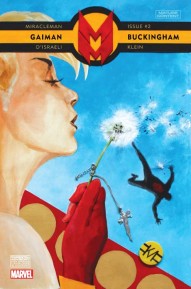
• John Gallaway rejected Miracleman's new world, rejected companionship, rejected love - until the night Miraclewoman visited him...
• The schoolyard rebels strut their stuff and debate the teenage idol of The Golden Age, Johnny Bates, in "Trends."
• Miracleman explores deeper into Infra-Space in "Retrieval."
• Including material originally presented in MIRACLEMAN (1985) #18, plus bonus content.
Miracleman #2 is another prime example of Neil Gaiman's unparalleled talent and imagination, as well as his skillful exploration of our most basic human qualities in even the most fantastic narratives. The artwork by Mark Buckingham perfectly suits each story's tone, and beautifully compliments Gaiman's dialogue and narration. As an example of some of Gaiman's earliest work, it's clear to see why he's known today as one of modern comics' pioneers. Read Full Review
Miracleman has a solid installment all around here yet I find myself thinking that the second story is one that might resonate better if I had re-read everything from the first three books before this one. Such is the price one pays sometimes. This issue really works well for me with the first story on a number of levels and is the kind of almost Twilight Zone type of standalone piece amid the bigger tapestry that examines parts of a world. I liked the second installment for the shift in art style but I couldn't connect with the characters or setting for a number of reasons. The ideas behind it are solid though and the takeaway of how life in a world like this in the Golden Age would be growing up is really interesting to examine more deeply. Read Full Review
Alongside the second story in the issue, which heavily hints at the return of Bates, a pattern is already becoming evident in which Gaimans run is serving as a response to and refutation of Moores thesis. For Gaiman, the apocalypse has not brought forth a new creation; though the gods have come and the world is better for their labors, they have neither made earth a paradise nor brought heaven with them. That kind of apotheosis is beyond them. And like the petitioners of the last two issues, the reader too walks away disappointed. Read Full Review